Leadership Experience Reflection: Transformational Leadership Theory
VerifiedAdded on 2021/06/18
|11
|2553
|22
Essay
AI Summary
This essay is a reflective analysis of a student's leadership experience, framed by Gibb's reflective learning model and the transformational leadership theory. The student begins by defining leadership and its importance in achieving goals, then focuses on transformational leadership, exploring its concepts, including charisma, inspirational motivation, intellectual stimulation, and individual concern. The essay incorporates analysis of questionnaires on leadership perceptions, highlighting lessons learned about transparency, skill development, and participatory leadership. The student discusses a class debate experience as a moderator, emphasizing the importance of neutrality and non-partisanship. The essay concludes with self-reflection on areas for improvement, particularly in balancing firmness with follower input, and emphasizes the significance of fostering a culture of leadership and promoting unity within a group, advocating for a transformative leadership style. The student believes that the development of a group is primarily determined by the quality of its leadership.

UNIVERSITY NAME
Student’s Name
ID
INSERT TITLE
Student’s Name
ID
INSERT TITLE
Paraphrase This Document
Need a fresh take? Get an instant paraphrase of this document with our AI Paraphraser
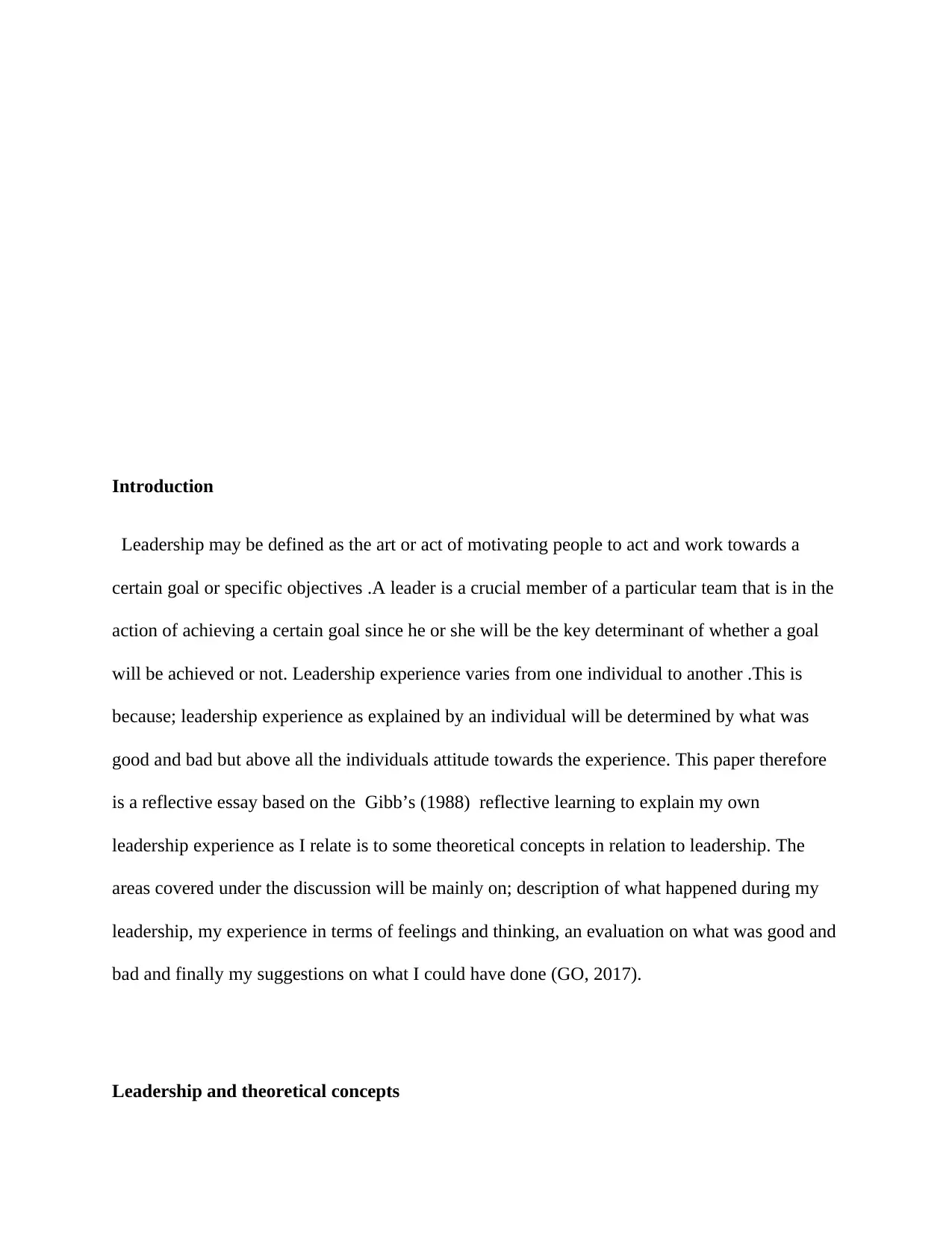
Introduction
Leadership may be defined as the art or act of motivating people to act and work towards a
certain goal or specific objectives .A leader is a crucial member of a particular team that is in the
action of achieving a certain goal since he or she will be the key determinant of whether a goal
will be achieved or not. Leadership experience varies from one individual to another .This is
because; leadership experience as explained by an individual will be determined by what was
good and bad but above all the individuals attitude towards the experience. This paper therefore
is a reflective essay based on the Gibb’s (1988) reflective learning to explain my own
leadership experience as I relate is to some theoretical concepts in relation to leadership. The
areas covered under the discussion will be mainly on; description of what happened during my
leadership, my experience in terms of feelings and thinking, an evaluation on what was good and
bad and finally my suggestions on what I could have done (GO, 2017).
Leadership and theoretical concepts
Leadership may be defined as the art or act of motivating people to act and work towards a
certain goal or specific objectives .A leader is a crucial member of a particular team that is in the
action of achieving a certain goal since he or she will be the key determinant of whether a goal
will be achieved or not. Leadership experience varies from one individual to another .This is
because; leadership experience as explained by an individual will be determined by what was
good and bad but above all the individuals attitude towards the experience. This paper therefore
is a reflective essay based on the Gibb’s (1988) reflective learning to explain my own
leadership experience as I relate is to some theoretical concepts in relation to leadership. The
areas covered under the discussion will be mainly on; description of what happened during my
leadership, my experience in terms of feelings and thinking, an evaluation on what was good and
bad and finally my suggestions on what I could have done (GO, 2017).
Leadership and theoretical concepts
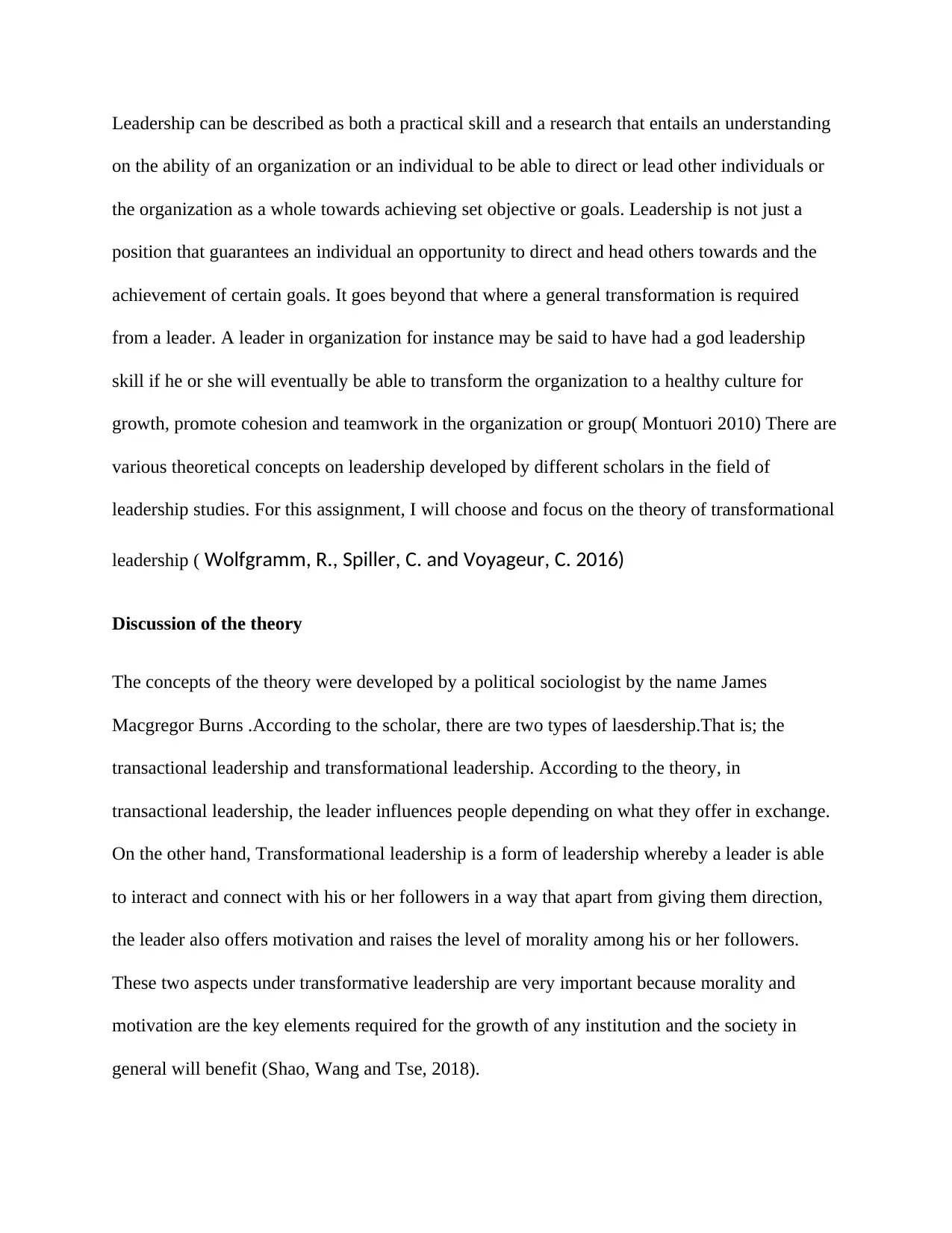
Leadership can be described as both a practical skill and a research that entails an understanding
on the ability of an organization or an individual to be able to direct or lead other individuals or
the organization as a whole towards achieving set objective or goals. Leadership is not just a
position that guarantees an individual an opportunity to direct and head others towards and the
achievement of certain goals. It goes beyond that where a general transformation is required
from a leader. A leader in organization for instance may be said to have had a god leadership
skill if he or she will eventually be able to transform the organization to a healthy culture for
growth, promote cohesion and teamwork in the organization or group( Montuori 2010) There are
various theoretical concepts on leadership developed by different scholars in the field of
leadership studies. For this assignment, I will choose and focus on the theory of transformational
leadership ( Wolfgramm, R., Spiller, C. and Voyageur, C. 2016)
Discussion of the theory
The concepts of the theory were developed by a political sociologist by the name James
Macgregor Burns .According to the scholar, there are two types of laesdership.That is; the
transactional leadership and transformational leadership. According to the theory, in
transactional leadership, the leader influences people depending on what they offer in exchange.
On the other hand, Transformational leadership is a form of leadership whereby a leader is able
to interact and connect with his or her followers in a way that apart from giving them direction,
the leader also offers motivation and raises the level of morality among his or her followers.
These two aspects under transformative leadership are very important because morality and
motivation are the key elements required for the growth of any institution and the society in
general will benefit (Shao, Wang and Tse, 2018).
on the ability of an organization or an individual to be able to direct or lead other individuals or
the organization as a whole towards achieving set objective or goals. Leadership is not just a
position that guarantees an individual an opportunity to direct and head others towards and the
achievement of certain goals. It goes beyond that where a general transformation is required
from a leader. A leader in organization for instance may be said to have had a god leadership
skill if he or she will eventually be able to transform the organization to a healthy culture for
growth, promote cohesion and teamwork in the organization or group( Montuori 2010) There are
various theoretical concepts on leadership developed by different scholars in the field of
leadership studies. For this assignment, I will choose and focus on the theory of transformational
leadership ( Wolfgramm, R., Spiller, C. and Voyageur, C. 2016)
Discussion of the theory
The concepts of the theory were developed by a political sociologist by the name James
Macgregor Burns .According to the scholar, there are two types of laesdership.That is; the
transactional leadership and transformational leadership. According to the theory, in
transactional leadership, the leader influences people depending on what they offer in exchange.
On the other hand, Transformational leadership is a form of leadership whereby a leader is able
to interact and connect with his or her followers in a way that apart from giving them direction,
the leader also offers motivation and raises the level of morality among his or her followers.
These two aspects under transformative leadership are very important because morality and
motivation are the key elements required for the growth of any institution and the society in
general will benefit (Shao, Wang and Tse, 2018).
⊘ This is a preview!⊘
Do you want full access?
Subscribe today to unlock all pages.

Trusted by 1+ million students worldwide
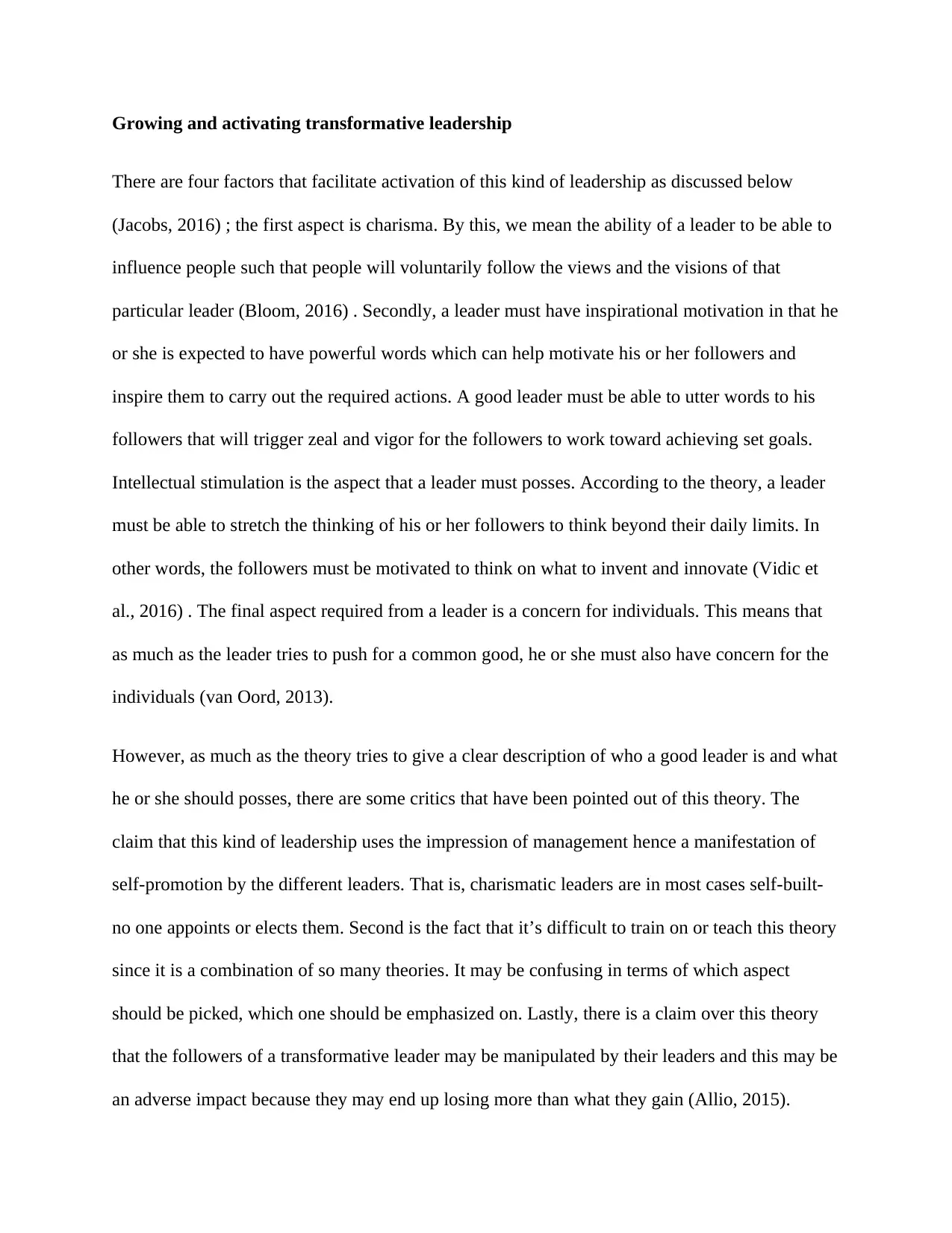
Growing and activating transformative leadership
There are four factors that facilitate activation of this kind of leadership as discussed below
(Jacobs, 2016) ; the first aspect is charisma. By this, we mean the ability of a leader to be able to
influence people such that people will voluntarily follow the views and the visions of that
particular leader (Bloom, 2016) . Secondly, a leader must have inspirational motivation in that he
or she is expected to have powerful words which can help motivate his or her followers and
inspire them to carry out the required actions. A good leader must be able to utter words to his
followers that will trigger zeal and vigor for the followers to work toward achieving set goals.
Intellectual stimulation is the aspect that a leader must posses. According to the theory, a leader
must be able to stretch the thinking of his or her followers to think beyond their daily limits. In
other words, the followers must be motivated to think on what to invent and innovate (Vidic et
al., 2016) . The final aspect required from a leader is a concern for individuals. This means that
as much as the leader tries to push for a common good, he or she must also have concern for the
individuals (van Oord, 2013).
However, as much as the theory tries to give a clear description of who a good leader is and what
he or she should posses, there are some critics that have been pointed out of this theory. The
claim that this kind of leadership uses the impression of management hence a manifestation of
self-promotion by the different leaders. That is, charismatic leaders are in most cases self-built-
no one appoints or elects them. Second is the fact that it’s difficult to train on or teach this theory
since it is a combination of so many theories. It may be confusing in terms of which aspect
should be picked, which one should be emphasized on. Lastly, there is a claim over this theory
that the followers of a transformative leader may be manipulated by their leaders and this may be
an adverse impact because they may end up losing more than what they gain (Allio, 2015).
There are four factors that facilitate activation of this kind of leadership as discussed below
(Jacobs, 2016) ; the first aspect is charisma. By this, we mean the ability of a leader to be able to
influence people such that people will voluntarily follow the views and the visions of that
particular leader (Bloom, 2016) . Secondly, a leader must have inspirational motivation in that he
or she is expected to have powerful words which can help motivate his or her followers and
inspire them to carry out the required actions. A good leader must be able to utter words to his
followers that will trigger zeal and vigor for the followers to work toward achieving set goals.
Intellectual stimulation is the aspect that a leader must posses. According to the theory, a leader
must be able to stretch the thinking of his or her followers to think beyond their daily limits. In
other words, the followers must be motivated to think on what to invent and innovate (Vidic et
al., 2016) . The final aspect required from a leader is a concern for individuals. This means that
as much as the leader tries to push for a common good, he or she must also have concern for the
individuals (van Oord, 2013).
However, as much as the theory tries to give a clear description of who a good leader is and what
he or she should posses, there are some critics that have been pointed out of this theory. The
claim that this kind of leadership uses the impression of management hence a manifestation of
self-promotion by the different leaders. That is, charismatic leaders are in most cases self-built-
no one appoints or elects them. Second is the fact that it’s difficult to train on or teach this theory
since it is a combination of so many theories. It may be confusing in terms of which aspect
should be picked, which one should be emphasized on. Lastly, there is a claim over this theory
that the followers of a transformative leader may be manipulated by their leaders and this may be
an adverse impact because they may end up losing more than what they gain (Allio, 2015).
Paraphrase This Document
Need a fresh take? Get an instant paraphrase of this document with our AI Paraphraser
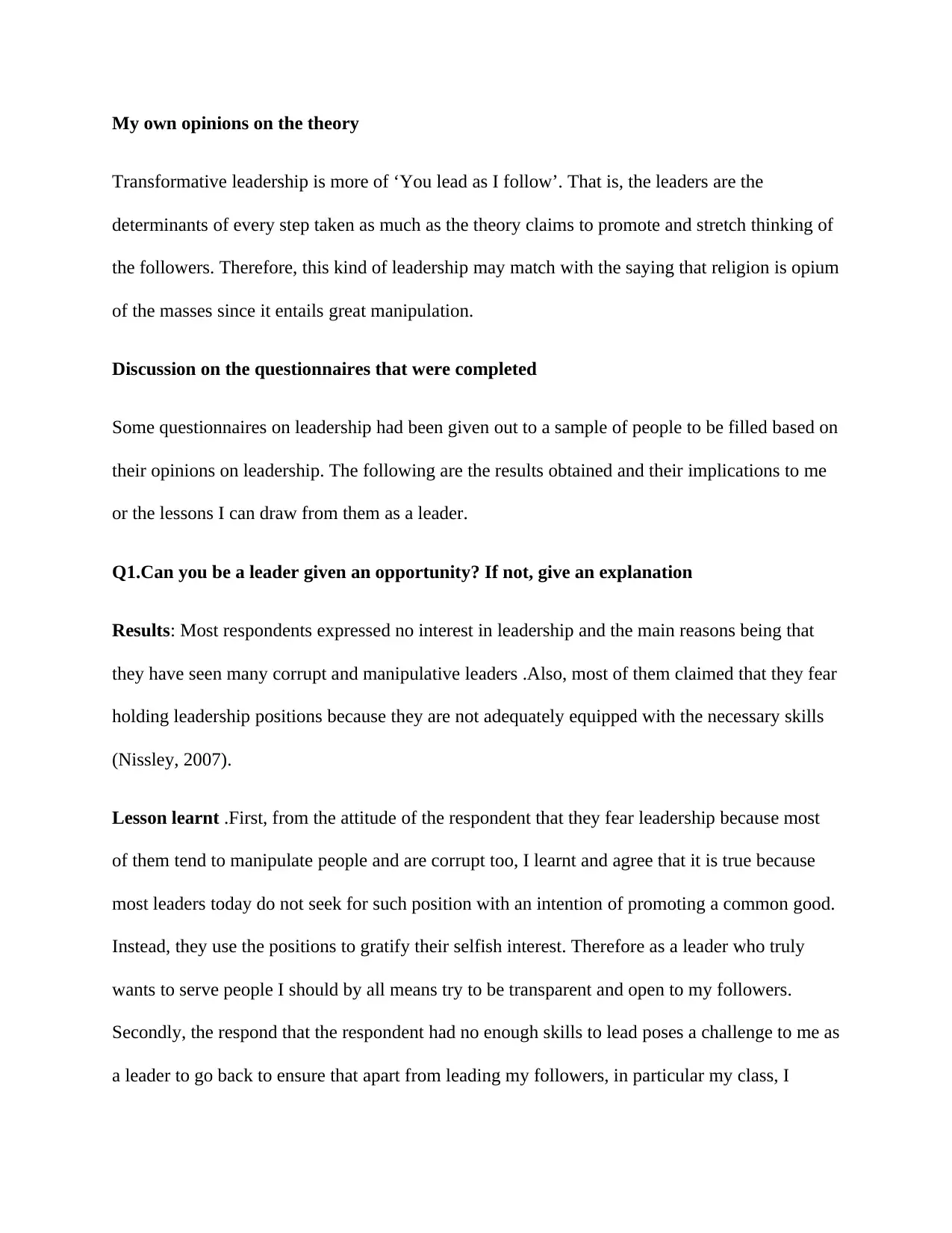
My own opinions on the theory
Transformative leadership is more of ‘You lead as I follow’. That is, the leaders are the
determinants of every step taken as much as the theory claims to promote and stretch thinking of
the followers. Therefore, this kind of leadership may match with the saying that religion is opium
of the masses since it entails great manipulation.
Discussion on the questionnaires that were completed
Some questionnaires on leadership had been given out to a sample of people to be filled based on
their opinions on leadership. The following are the results obtained and their implications to me
or the lessons I can draw from them as a leader.
Q1.Can you be a leader given an opportunity? If not, give an explanation
Results: Most respondents expressed no interest in leadership and the main reasons being that
they have seen many corrupt and manipulative leaders .Also, most of them claimed that they fear
holding leadership positions because they are not adequately equipped with the necessary skills
(Nissley, 2007).
Lesson learnt .First, from the attitude of the respondent that they fear leadership because most
of them tend to manipulate people and are corrupt too, I learnt and agree that it is true because
most leaders today do not seek for such position with an intention of promoting a common good.
Instead, they use the positions to gratify their selfish interest. Therefore as a leader who truly
wants to serve people I should by all means try to be transparent and open to my followers.
Secondly, the respond that the respondent had no enough skills to lead poses a challenge to me as
a leader to go back to ensure that apart from leading my followers, in particular my class, I
Transformative leadership is more of ‘You lead as I follow’. That is, the leaders are the
determinants of every step taken as much as the theory claims to promote and stretch thinking of
the followers. Therefore, this kind of leadership may match with the saying that religion is opium
of the masses since it entails great manipulation.
Discussion on the questionnaires that were completed
Some questionnaires on leadership had been given out to a sample of people to be filled based on
their opinions on leadership. The following are the results obtained and their implications to me
or the lessons I can draw from them as a leader.
Q1.Can you be a leader given an opportunity? If not, give an explanation
Results: Most respondents expressed no interest in leadership and the main reasons being that
they have seen many corrupt and manipulative leaders .Also, most of them claimed that they fear
holding leadership positions because they are not adequately equipped with the necessary skills
(Nissley, 2007).
Lesson learnt .First, from the attitude of the respondent that they fear leadership because most
of them tend to manipulate people and are corrupt too, I learnt and agree that it is true because
most leaders today do not seek for such position with an intention of promoting a common good.
Instead, they use the positions to gratify their selfish interest. Therefore as a leader who truly
wants to serve people I should by all means try to be transparent and open to my followers.
Secondly, the respond that the respondent had no enough skills to lead poses a challenge to me as
a leader to go back to ensure that apart from leading my followers, in particular my class, I
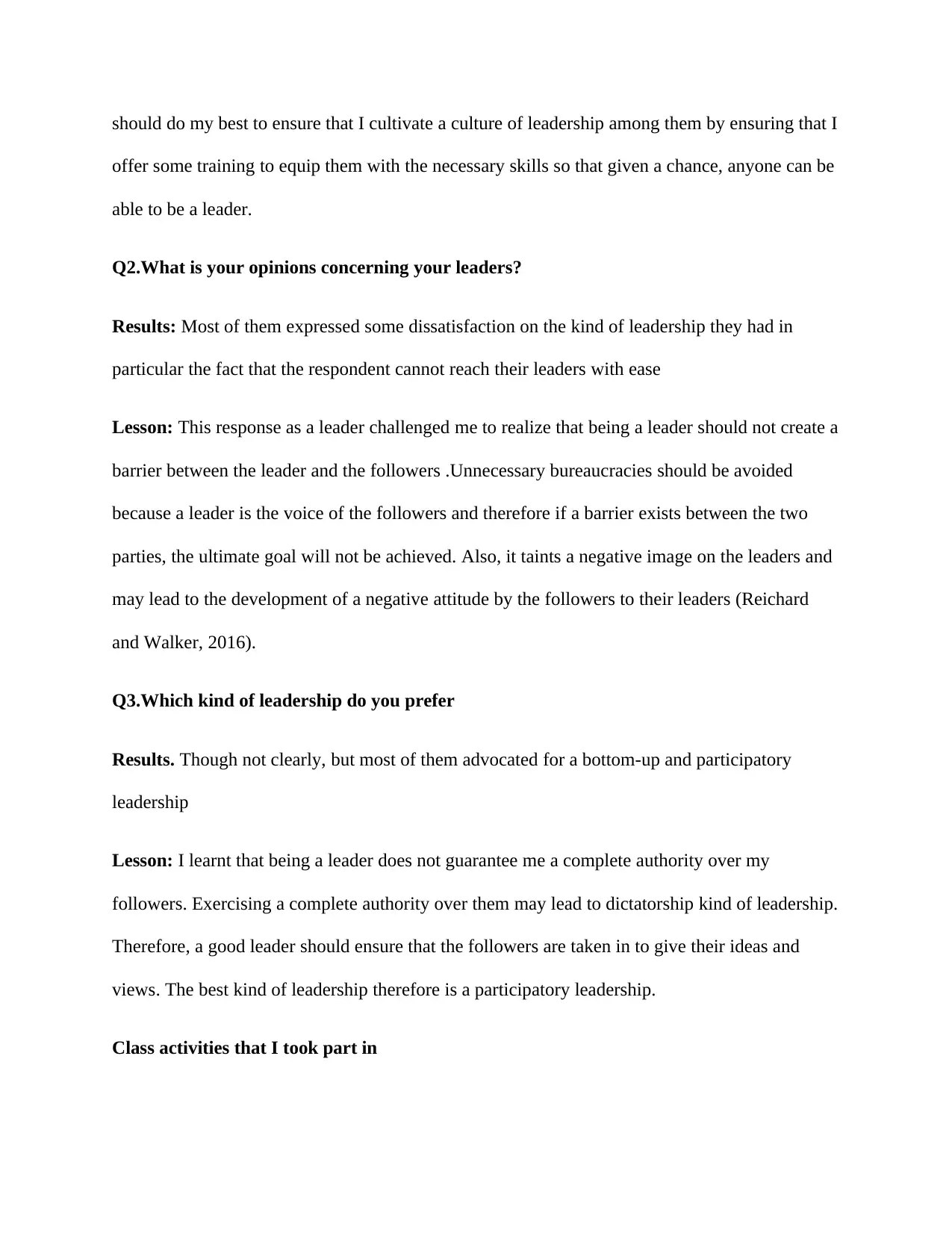
should do my best to ensure that I cultivate a culture of leadership among them by ensuring that I
offer some training to equip them with the necessary skills so that given a chance, anyone can be
able to be a leader.
Q2.What is your opinions concerning your leaders?
Results: Most of them expressed some dissatisfaction on the kind of leadership they had in
particular the fact that the respondent cannot reach their leaders with ease
Lesson: This response as a leader challenged me to realize that being a leader should not create a
barrier between the leader and the followers .Unnecessary bureaucracies should be avoided
because a leader is the voice of the followers and therefore if a barrier exists between the two
parties, the ultimate goal will not be achieved. Also, it taints a negative image on the leaders and
may lead to the development of a negative attitude by the followers to their leaders (Reichard
and Walker, 2016).
Q3.Which kind of leadership do you prefer
Results. Though not clearly, but most of them advocated for a bottom-up and participatory
leadership
Lesson: I learnt that being a leader does not guarantee me a complete authority over my
followers. Exercising a complete authority over them may lead to dictatorship kind of leadership.
Therefore, a good leader should ensure that the followers are taken in to give their ideas and
views. The best kind of leadership therefore is a participatory leadership.
Class activities that I took part in
offer some training to equip them with the necessary skills so that given a chance, anyone can be
able to be a leader.
Q2.What is your opinions concerning your leaders?
Results: Most of them expressed some dissatisfaction on the kind of leadership they had in
particular the fact that the respondent cannot reach their leaders with ease
Lesson: This response as a leader challenged me to realize that being a leader should not create a
barrier between the leader and the followers .Unnecessary bureaucracies should be avoided
because a leader is the voice of the followers and therefore if a barrier exists between the two
parties, the ultimate goal will not be achieved. Also, it taints a negative image on the leaders and
may lead to the development of a negative attitude by the followers to their leaders (Reichard
and Walker, 2016).
Q3.Which kind of leadership do you prefer
Results. Though not clearly, but most of them advocated for a bottom-up and participatory
leadership
Lesson: I learnt that being a leader does not guarantee me a complete authority over my
followers. Exercising a complete authority over them may lead to dictatorship kind of leadership.
Therefore, a good leader should ensure that the followers are taken in to give their ideas and
views. The best kind of leadership therefore is a participatory leadership.
Class activities that I took part in
⊘ This is a preview!⊘
Do you want full access?
Subscribe today to unlock all pages.

Trusted by 1+ million students worldwide
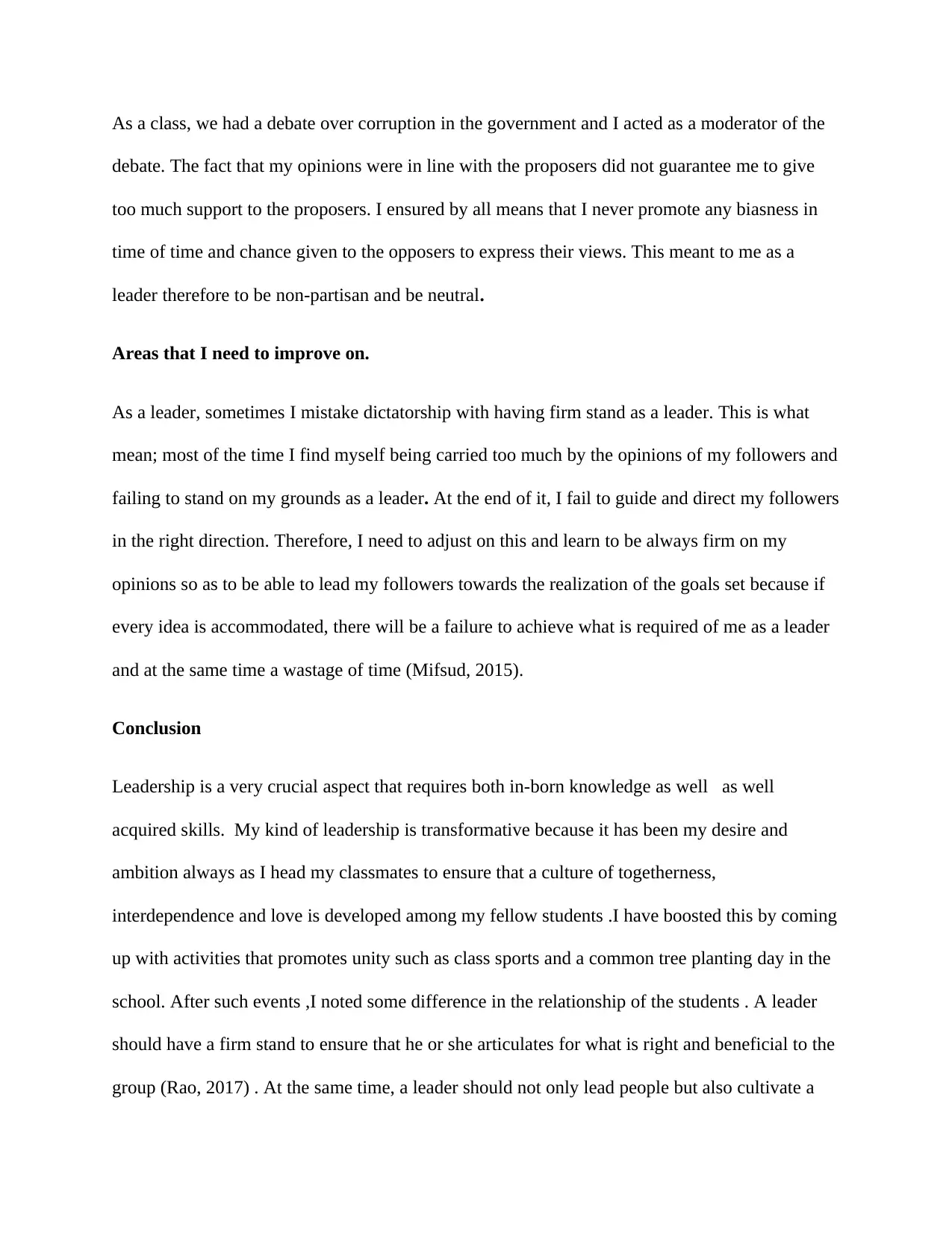
As a class, we had a debate over corruption in the government and I acted as a moderator of the
debate. The fact that my opinions were in line with the proposers did not guarantee me to give
too much support to the proposers. I ensured by all means that I never promote any biasness in
time of time and chance given to the opposers to express their views. This meant to me as a
leader therefore to be non-partisan and be neutral.
Areas that I need to improve on.
As a leader, sometimes I mistake dictatorship with having firm stand as a leader. This is what
mean; most of the time I find myself being carried too much by the opinions of my followers and
failing to stand on my grounds as a leader. At the end of it, I fail to guide and direct my followers
in the right direction. Therefore, I need to adjust on this and learn to be always firm on my
opinions so as to be able to lead my followers towards the realization of the goals set because if
every idea is accommodated, there will be a failure to achieve what is required of me as a leader
and at the same time a wastage of time (Mifsud, 2015).
Conclusion
Leadership is a very crucial aspect that requires both in-born knowledge as well as well
acquired skills. My kind of leadership is transformative because it has been my desire and
ambition always as I head my classmates to ensure that a culture of togetherness,
interdependence and love is developed among my fellow students .I have boosted this by coming
up with activities that promotes unity such as class sports and a common tree planting day in the
school. After such events ,I noted some difference in the relationship of the students . A leader
should have a firm stand to ensure that he or she articulates for what is right and beneficial to the
group (Rao, 2017) . At the same time, a leader should not only lead people but also cultivate a
debate. The fact that my opinions were in line with the proposers did not guarantee me to give
too much support to the proposers. I ensured by all means that I never promote any biasness in
time of time and chance given to the opposers to express their views. This meant to me as a
leader therefore to be non-partisan and be neutral.
Areas that I need to improve on.
As a leader, sometimes I mistake dictatorship with having firm stand as a leader. This is what
mean; most of the time I find myself being carried too much by the opinions of my followers and
failing to stand on my grounds as a leader. At the end of it, I fail to guide and direct my followers
in the right direction. Therefore, I need to adjust on this and learn to be always firm on my
opinions so as to be able to lead my followers towards the realization of the goals set because if
every idea is accommodated, there will be a failure to achieve what is required of me as a leader
and at the same time a wastage of time (Mifsud, 2015).
Conclusion
Leadership is a very crucial aspect that requires both in-born knowledge as well as well
acquired skills. My kind of leadership is transformative because it has been my desire and
ambition always as I head my classmates to ensure that a culture of togetherness,
interdependence and love is developed among my fellow students .I have boosted this by coming
up with activities that promotes unity such as class sports and a common tree planting day in the
school. After such events ,I noted some difference in the relationship of the students . A leader
should have a firm stand to ensure that he or she articulates for what is right and beneficial to the
group (Rao, 2017) . At the same time, a leader should not only lead people but also cultivate a
Paraphrase This Document
Need a fresh take? Get an instant paraphrase of this document with our AI Paraphraser
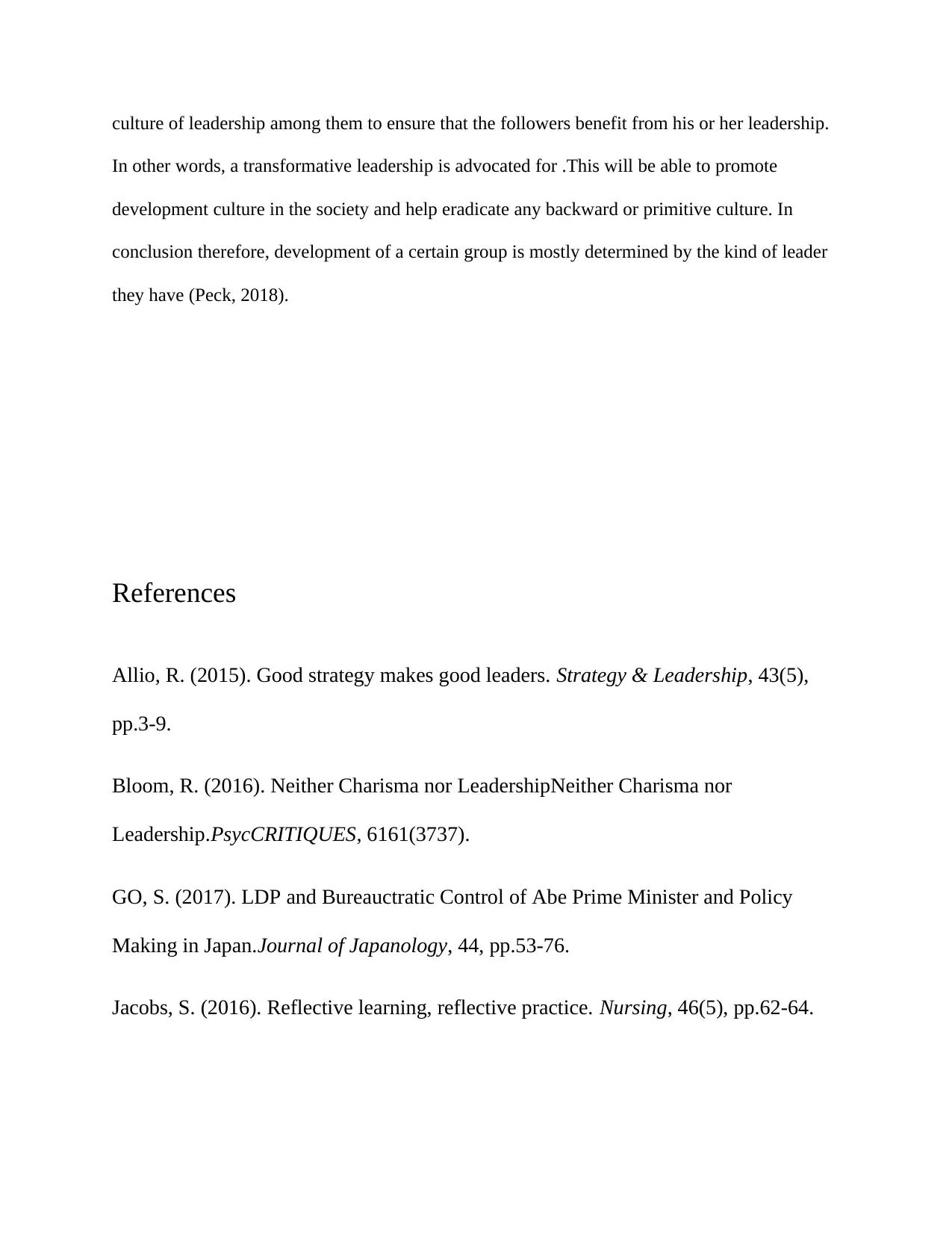
culture of leadership among them to ensure that the followers benefit from his or her leadership.
In other words, a transformative leadership is advocated for .This will be able to promote
development culture in the society and help eradicate any backward or primitive culture. In
conclusion therefore, development of a certain group is mostly determined by the kind of leader
they have (Peck, 2018).
References
Allio, R. (2015). Good strategy makes good leaders. Strategy & Leadership, 43(5),
pp.3-9.
Bloom, R. (2016). Neither Charisma nor LeadershipNeither Charisma nor
Leadership.PsycCRITIQUES, 6161(3737).
GO, S. (2017). LDP and Bureauctratic Control of Abe Prime Minister and Policy
Making in Japan.Journal of Japanology, 44, pp.53-76.
Jacobs, S. (2016). Reflective learning, reflective practice. Nursing, 46(5), pp.62-64.
In other words, a transformative leadership is advocated for .This will be able to promote
development culture in the society and help eradicate any backward or primitive culture. In
conclusion therefore, development of a certain group is mostly determined by the kind of leader
they have (Peck, 2018).
References
Allio, R. (2015). Good strategy makes good leaders. Strategy & Leadership, 43(5),
pp.3-9.
Bloom, R. (2016). Neither Charisma nor LeadershipNeither Charisma nor
Leadership.PsycCRITIQUES, 6161(3737).
GO, S. (2017). LDP and Bureauctratic Control of Abe Prime Minister and Policy
Making in Japan.Journal of Japanology, 44, pp.53-76.
Jacobs, S. (2016). Reflective learning, reflective practice. Nursing, 46(5), pp.62-64.
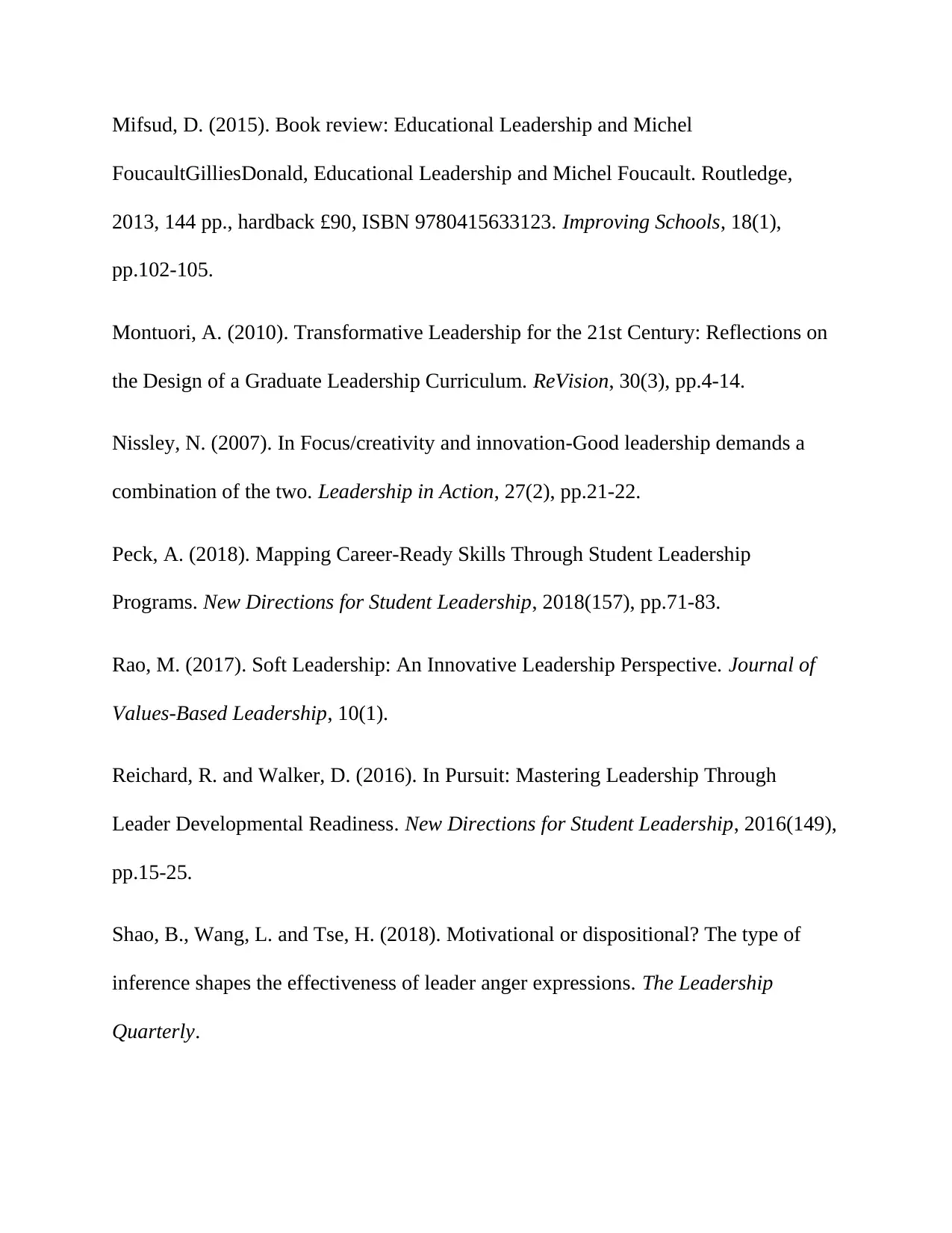
Mifsud, D. (2015). Book review: Educational Leadership and Michel
FoucaultGilliesDonald, Educational Leadership and Michel Foucault. Routledge,
2013, 144 pp., hardback £90, ISBN 9780415633123. Improving Schools, 18(1),
pp.102-105.
Montuori, A. (2010). Transformative Leadership for the 21st Century: Reflections on
the Design of a Graduate Leadership Curriculum. ReVision, 30(3), pp.4-14.
Nissley, N. (2007). In Focus/creativity and innovation-Good leadership demands a
combination of the two. Leadership in Action, 27(2), pp.21-22.
Peck, A. (2018). Mapping Career-Ready Skills Through Student Leadership
Programs. New Directions for Student Leadership, 2018(157), pp.71-83.
Rao, M. (2017). Soft Leadership: An Innovative Leadership Perspective. Journal of
Values-Based Leadership, 10(1).
Reichard, R. and Walker, D. (2016). In Pursuit: Mastering Leadership Through
Leader Developmental Readiness. New Directions for Student Leadership, 2016(149),
pp.15-25.
Shao, B., Wang, L. and Tse, H. (2018). Motivational or dispositional? The type of
inference shapes the effectiveness of leader anger expressions. The Leadership
Quarterly.
FoucaultGilliesDonald, Educational Leadership and Michel Foucault. Routledge,
2013, 144 pp., hardback £90, ISBN 9780415633123. Improving Schools, 18(1),
pp.102-105.
Montuori, A. (2010). Transformative Leadership for the 21st Century: Reflections on
the Design of a Graduate Leadership Curriculum. ReVision, 30(3), pp.4-14.
Nissley, N. (2007). In Focus/creativity and innovation-Good leadership demands a
combination of the two. Leadership in Action, 27(2), pp.21-22.
Peck, A. (2018). Mapping Career-Ready Skills Through Student Leadership
Programs. New Directions for Student Leadership, 2018(157), pp.71-83.
Rao, M. (2017). Soft Leadership: An Innovative Leadership Perspective. Journal of
Values-Based Leadership, 10(1).
Reichard, R. and Walker, D. (2016). In Pursuit: Mastering Leadership Through
Leader Developmental Readiness. New Directions for Student Leadership, 2016(149),
pp.15-25.
Shao, B., Wang, L. and Tse, H. (2018). Motivational or dispositional? The type of
inference shapes the effectiveness of leader anger expressions. The Leadership
Quarterly.
⊘ This is a preview!⊘
Do you want full access?
Subscribe today to unlock all pages.

Trusted by 1+ million students worldwide
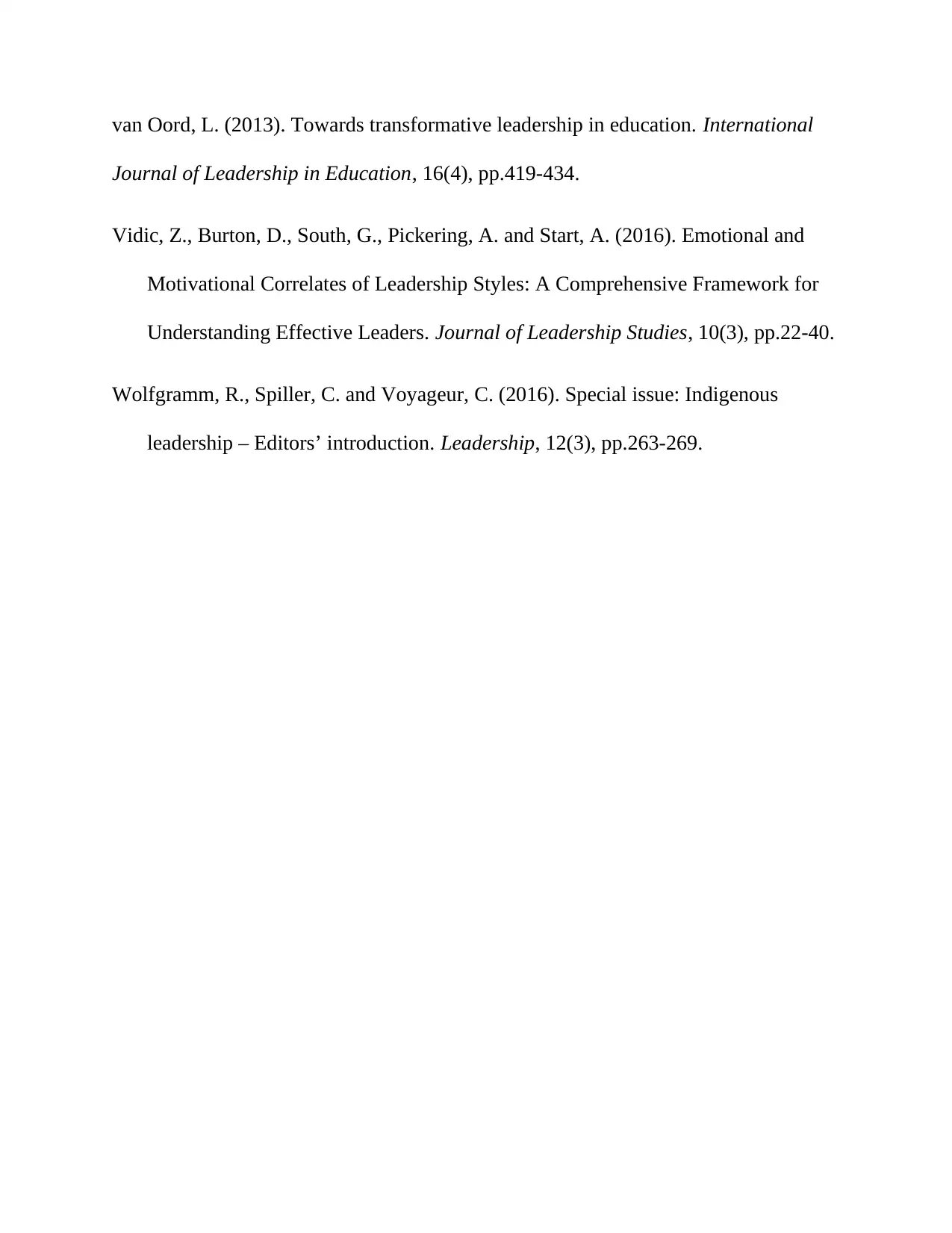
van Oord, L. (2013). Towards transformative leadership in education. International
Journal of Leadership in Education, 16(4), pp.419-434.
Vidic, Z., Burton, D., South, G., Pickering, A. and Start, A. (2016). Emotional and
Motivational Correlates of Leadership Styles: A Comprehensive Framework for
Understanding Effective Leaders. Journal of Leadership Studies, 10(3), pp.22-40.
Wolfgramm, R., Spiller, C. and Voyageur, C. (2016). Special issue: Indigenous
leadership – Editors’ introduction. Leadership, 12(3), pp.263-269.
Journal of Leadership in Education, 16(4), pp.419-434.
Vidic, Z., Burton, D., South, G., Pickering, A. and Start, A. (2016). Emotional and
Motivational Correlates of Leadership Styles: A Comprehensive Framework for
Understanding Effective Leaders. Journal of Leadership Studies, 10(3), pp.22-40.
Wolfgramm, R., Spiller, C. and Voyageur, C. (2016). Special issue: Indigenous
leadership – Editors’ introduction. Leadership, 12(3), pp.263-269.
Paraphrase This Document
Need a fresh take? Get an instant paraphrase of this document with our AI Paraphraser
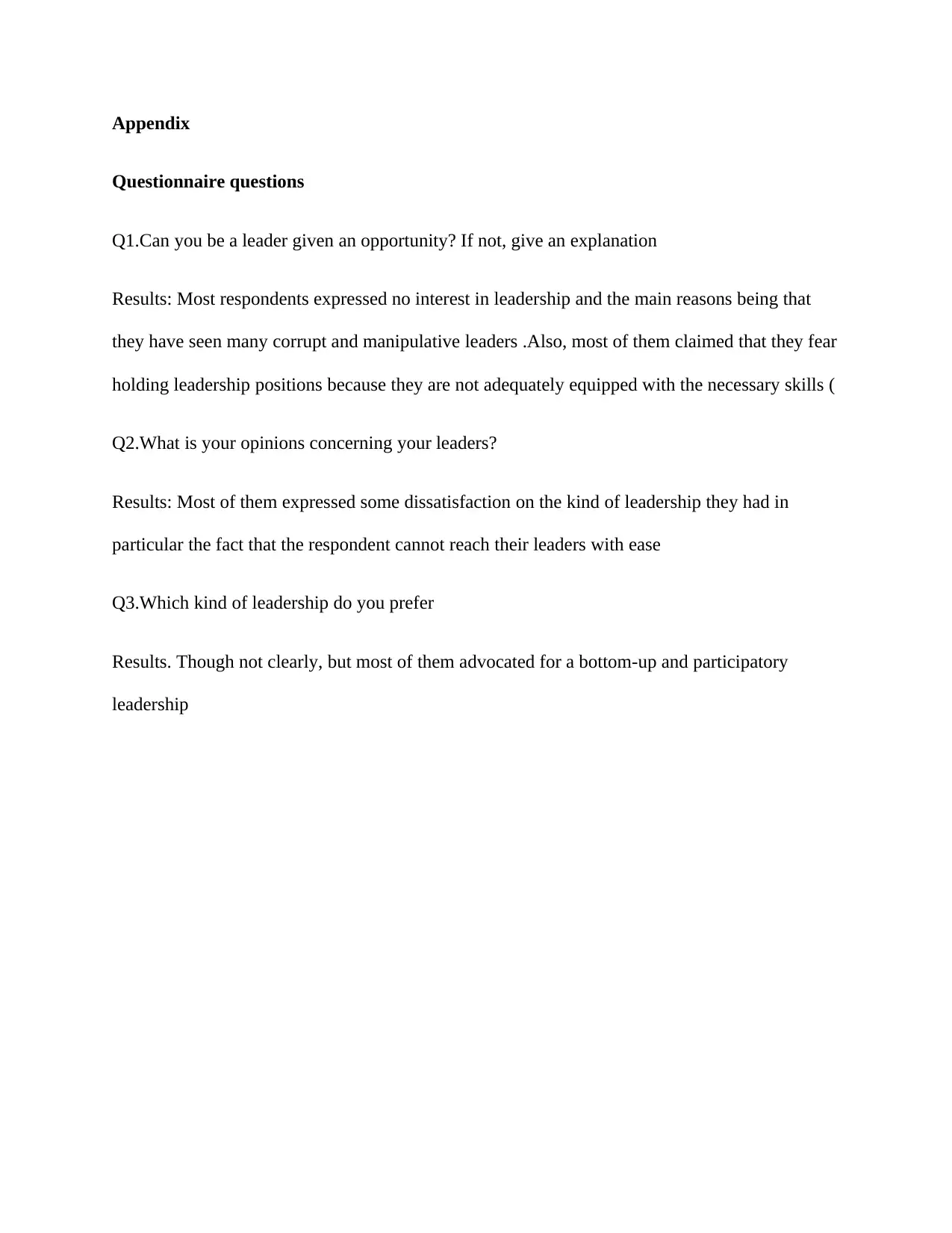
Appendix
Questionnaire questions
Q1.Can you be a leader given an opportunity? If not, give an explanation
Results: Most respondents expressed no interest in leadership and the main reasons being that
they have seen many corrupt and manipulative leaders .Also, most of them claimed that they fear
holding leadership positions because they are not adequately equipped with the necessary skills (
Q2.What is your opinions concerning your leaders?
Results: Most of them expressed some dissatisfaction on the kind of leadership they had in
particular the fact that the respondent cannot reach their leaders with ease
Q3.Which kind of leadership do you prefer
Results. Though not clearly, but most of them advocated for a bottom-up and participatory
leadership
Questionnaire questions
Q1.Can you be a leader given an opportunity? If not, give an explanation
Results: Most respondents expressed no interest in leadership and the main reasons being that
they have seen many corrupt and manipulative leaders .Also, most of them claimed that they fear
holding leadership positions because they are not adequately equipped with the necessary skills (
Q2.What is your opinions concerning your leaders?
Results: Most of them expressed some dissatisfaction on the kind of leadership they had in
particular the fact that the respondent cannot reach their leaders with ease
Q3.Which kind of leadership do you prefer
Results. Though not clearly, but most of them advocated for a bottom-up and participatory
leadership
1 out of 11
Related Documents
Your All-in-One AI-Powered Toolkit for Academic Success.
+13062052269
info@desklib.com
Available 24*7 on WhatsApp / Email
![[object Object]](/_next/static/media/star-bottom.7253800d.svg)
Unlock your academic potential
Copyright © 2020–2026 A2Z Services. All Rights Reserved. Developed and managed by ZUCOL.





